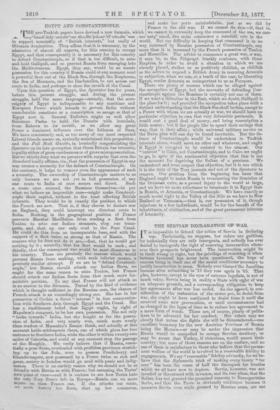THE SERVIAN DECLARATION OF WAR.
I T is impossible to defend the action of Servia in declaring war. Technically, we suppose, her rulers are guiltless, for technically they are only insurgents, and nobody has ever denied to insurgents the right of renewing insurrection when- ever their prospects brightened. The insurrection might be in itself wrong or right, but the privilege of renewing it when fortune favoured has never been questioned, the hope of success being in itself one of the moral conditions necessary to justify insurrection in arms. Nobody ever blamed the Jacobites because after submitting in '15 they rose again in '45. That plea, however, except in the eyes of extreme legalists, is not of much value, Servia being in reality a State with right of war on adequate grounds, and a corresponding obligation to keep her agreements after war has ended. As she agreed, in con- sideration of the restoration of the status quo, .to desist from war, she ought to have continued to desist from it until she received some new provocation, or until circumstances had so changed in the lapse of time as to reduce her agreement to a mere form of words. There are, of course, plenty of pallia- tives to be advanced for her conduct. Her rulers may see clearly that unless she fights she will be dismembered—one excellent boundary for the new Austrian Province of Bosnia • being the Morava—or may be under the impression that Russia would be compelled to occupy Berrien territory, or may be aware that Turkey, if victorious, would annex their country ; but none of those reasons are on the surface, and no one of them is satisfactory to those who believe that the perma- neat welfare of the world is involved in a reasonable fidelity to engagements. We say "reasonable "fidelity advisedly, for we be- lieve that the diplomatic trick of making every treaty "for ever" has been the cause of half the disrespect for treaties which we all have now to deplore. Servia, however, was not invaded or threatened with invasion, and its two pleas, that the Sultan has not granted the promised amnesty to Herzegovinian Serbs, and that the Porte is obviously vindictive because it menaces Servia even while pressed by Russian arms, are not intended to be serious. It could have fought for the Herzego- vinians before Plevna had fallen, and it is not seriously afraid of Turkish talk, even if it has been uttered. Berrie, in renew- ing the war because it is convenient to renew it, does, though under immense provocation, break faith, and we at least have no defence to offer. She deserved everything by her first war, which was a self-sacrifice for the benefit of others, but if she obtains nothing by her second, we cannot complain on her be- half that she has been ill-treated. She had no right to begin it.
Rightfully or wrongfully, however, there she is at war, and it is useless to underrate the force which she brings, directly and indirectly, to the Russian side. The indirect advantage is very great indeed. In the first place, by entering into war Servia reveals to the world that the Austrian Government is not afraid of Magyar opinion, which, always excitable, is most excitable of all when Serbs assume to take a foremost part in politics, and has no intention whatever of interfering by force with Russian action. We have been told for months past that Servia could not move because Count Andrassy had prohibited her from moving, and now we know that Count Andrassy was used by the Servian politicians as a very useful Jorkine, the silent partner who never would consent to any but the hardest terms. In the second place, the march of the Servians does much to retain Austria in that attitude, and make any change of policy at the Hofburg most improbable. More than a fifth of all Austrian officers are Serbs,who watch the movement of their race towards independence with passionate earnestness, who reeall the old traditions of Servian grandeur, and who feel for this branch of the Slavonic race more keenly than they feel for the race in its entirety. Of course, ordered to attack Serbs they will attack Serbs, as they would attack their own brothers in a street-riot, but the whole weight of that great body of necessary men will be thrown against any policy which renders such a fratricidal attack either probable or possible. The movement of Servia, in fact, helps and helps greatly to commit Austria to the anti-Turkish side, and Austria is the only neighbouring Power about whose sym- pathies doubt can reasonably be entertained. Nor is the direct advantage to Russia any less. One of the most singular peculiarities of the British mind is its contempt for the fighting power of small States, its instinctive feeling that they have, as it were, no right to exist unless they will remain quiet. We all fall into a trick of fancying that the position of Belgium or Switzerland, which is quite exceptional, and which involves a certain selfish abnegation of duty, is the right position for States which cannot hope to gain any terri- tory by war. The feeling is a natural one, but its correlative, a belief that small States are of little use in war, is either a delusion or an exaggeration. Roumania, though she has not put forward quite her full power in this campaign, has been of the greatest assistance to Russia, as great as Bavaria was in 1870 to Prussia ; and Servia, though unequal to a long war, can for one campaign put, into the field an army exceeding in number the movable army at the disposal of Great Britain. The resources behind that army are very different, but Servia can send over her frontier a fairly appointed force of 80,000 men, and will send, we do not doubt, at least 60,000. They
are worthless Well, as we have said, we think Servia should not have gone to war, and we think English contempt for Servia on this ground fairly justified, but nevertheless the Eng- lish disbelief in the prowess of little nations is often unwarranted by facts. The Turks beat the Servians, no doubt, but then they very nearly beat the Russians. The prowess before which the 'Servians fell back from their positions at Alexinatz is the prowess before which the Russians so nearly fell back in the Shiplut Pass, with this difference, that the Russians, though worse armed than the Turks, possess at least an equal artil- lery. The unlucky Servians, not having raised or repudiated loans in London, had only old artillery, and found themselves liable to be massacred wholesale in a game at long bowls. We write on the evidence of eyewitnesses, when we say that the
• Servians in the last war behaved as well as any Slays ever behave, that is, were excellent soldiers in all but readiness of resource, except when opposed to artillery which their own antiquated cannon would not reach. The men were not drilled enough to fall without a hope of vengeance. The corps under Hervatovich fought like heroes, and now Horvato- vich commands the whole army, which, moreover, kae better selected officers, men trained for two years instead of two months, and bronze guns from the Essen factory which are
as good as any that the Turks possess. Nothing can destroy their efficiency except want of courage, and
upon that point English opinion is as inuch misled as it was in the Roumanian case. Nothing would at first con- vince our countrymen that the Roumanians, who liave_e_hifterv of heroism and who are watched, by the Hungarian Government with sleepless alarm and vigilance, were not a nation of effemi- nate cowards. Their wealthy landowners, settled in Bucharest, love luxury, hate work, and being Italian by blood, exaggerate the softly indolent Southern manner, and therefore peasants at work all day, living a rough, wild life in the open air, were sure to run away. The siege of Plevna showed that the Hohenzollern Prince who had devoted such pains and time, in the true Hohenzollern spirit, to make his Army a reality, had judged his subjects more accurately than prejudiced observers at a distance, and contempt for Roumanian military capacity was exchanged for active annoyance that they possessed so much. It will, in all human-probability, be the same with the Servians. They have no Hohenzollern Prince, it is true, to guide them, but an Obrenovitch, of whom no one speaks confidently, or we may add, intelligibly ; but they have the General they love, Horvatovich, they at last have decent mateWel, and they have a singularly favourable military position. They add an entire right wing to the Russian Army, and can by besieging Nish and threatening Sofia aid materially in its advance, without risking, until their troops are formed, a groat engagement in the field. They will fight desperately in position, and by be- sieging places like Nish, garrisoning positions like Plevna, and keeping up a perpetual uneasiness west of the Balkans, will release as many Russian troops as they themselves number. They may do much more than this, but at least they will do this. Whether they will prove themselves mobile or not we do not know, though we should think their supplies of money insufficient ; but at least they are equal to a leisurely advance southward, which it will require an entire army, and a good army, to resist. If they behave well in the field they will obtain their freedom, and immensely accelerate the enfran- chisement of their neighbours, by showing that these petty States can, with a little care and a little encouragement, make good armies. A new Turkey with five States in it of the Roumanian strength, and bound together either by a federal tie or a strict alliance, would be a very difficult country for Russia either to rule or to invade.







































 Previous page
Previous page